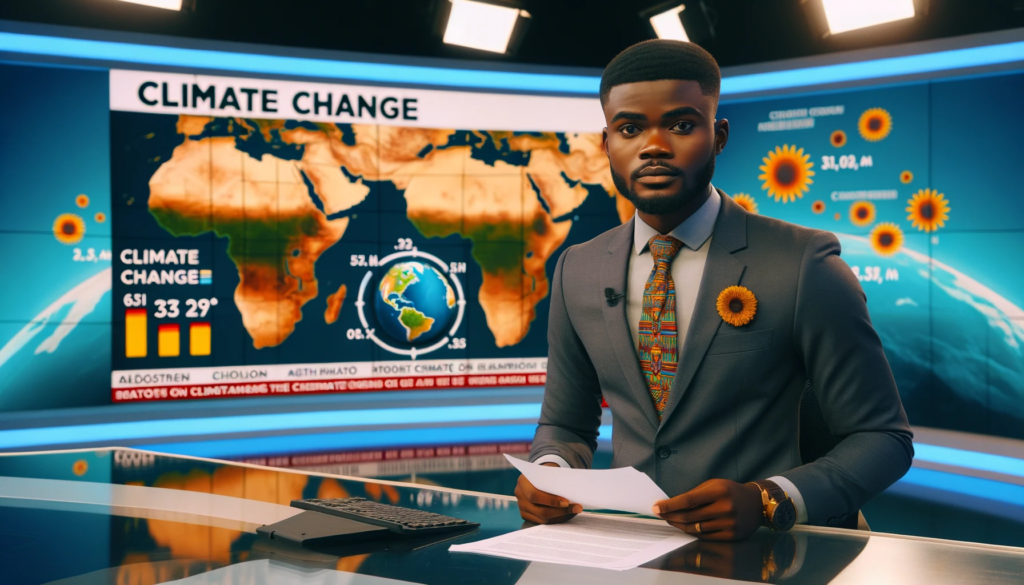The Pen and the Planet: Journalism’s Critical Role in Climate Change
1. CLIMATE CHANGE & JOURNALISM In a world teetering on the brink of irreversible climate disaster, the need for robust, actionable solutions has never been more acute. At the intersection of science, policy, community action, and global consciousness stands a singular force: Journalism. Armed with the power of the pen and the reach of the airwaves, journalists have the unparalleled opportunity — and indeed, the responsibility — to serve as catalysts for change. As we grapple with current extreme weather events and the stark reality that a majority of Ghana, nay the human race, remains vulnerable, the role of journalism in communicating, educating, and mobilising has evolved from being merely informative to fundamentally transformative. A. The Climate Imperative The world is increasingly besieged by climate challenges. Taking action has never been more crucial. While the threats are dire, opportunities abound for various stakeholders to make a tangible impact. B. The Role of Information Dissemination Journalists, influencers, and even casual social media users wield immense power in shaping public perception and driving collective action. These groups can act as catalysts in the fight against climate change. C. Business Incentives The business community is often viewed as reluctant to participate in sustainability efforts, primarily due to perceived costs. However, we will explore how adopting a climate-friendly stance can be simultaneously morally right and financially advantageous. D. What Lies Ahead From examining the role of journalism in propagating accurate information to investigating the untapped potential of social media influencers, we’ll explore a multi-faceted approach to climate action. Additionally, we’ll shed light on the financial incentives available to businesses for adopting sustainable practices. 2. THE SCIENCE BEHIND CLIMATE COMMUNICATION A. The Critical Intersection of Media and Science Climate change is not merely a narrative about rising temperatures and extreme weather events. It is a story deeply rooted in scientific research and data. Consequently, the media’s role isn’t merely that of a message-bearer but that of an educator in some respects. B. The State of Media Resources As it stands, many media houses will be quick to tell you that they are not fully equipped to disseminate the complexities of climate science to the global community. While there is a concerted effort to bring climate issues to the forefront, the focus often leans towards sensationalism, potentially leading to diluted or even inaccurate portrayals. The media houses have a point. C. Limitations and Challenges There are notable limitations to this scenario. Firstly, media personnel may not always have the scientific background to convey such intricate information. Secondly, the fast-paced nature of news dissemination may not lend itself to the thoroughness that scientific discussion often requires. Thirdly, there may be a lack of access to reliable scientific resources or experts, particularly in economically or socially disadvantaged regions. D. The Need for Up-skilling and Collaboration The obvious solution to this inadequacy lies in enhancing the capabilities of media professionals. This could include specialised training programs in climate science and continuous collaboration between journalists and scientific experts. This approach would help ensure that the information being spread is both accurate and impactful. 3. THE ROLE OF JOURNALISM IN CLIMATE ACTION A. The Media as a Funnel for Climate Awareness In our increasingly connected world, the media is a potent conduit for disseminating information. When it comes to climate change, the stakes are significantly higher. Journalists are not merely reporters; they become stewards of public awareness, tasked with communicating the severity and urgency of the issue. A journalist’s words can influence public opinion, spark debates, and even catalyse policy changes. Hence, the media’s role in shaping a collective consciousness about climate change cannot be overstated. B. The Challenge of Cross-Disciplinary Communication While the media have a substantial role in climate change communication, they also face the challenge of translating complex scientific jargon into accessible language. For instance, terms like ‘carbon footprint,’ ‘greenhouse gas emissions,’ or ‘ocean acidification’ might seem bewildering to a layperson. Journalists, therefore, must serve as intermediaries, capable of conveying scientific data in a manner that the average person not only understands but also feels compelled to act upon. It’s about making climate science as relatable as household discussions. This is clearly a challenge, but not an impossible one. C. The Power of Local Leadership in Climate Communication Local leaders, be they community elders, religious figures, or politicians, have a unique influence over their communities. Their words often carry more weight and immediacy than an outsider’s. Journalists can leverage this local influence by partnering with these community figures. The idea is to ‘localise’ climate change, to make it a pressing issue that communities can relate to and act upon. In essence, the media can serve as catalysts, empowering local leaders to drive home the urgency of the climate crisis. D. The Economics of Climate Communication: A Sustainable Approach Financial resources are the lifeblood of any large-scale initiative, and climate action is no exception. One can have all the good intentions in the world, but without the necessary funding, even the most ambitious projects will falter. That is why I advocate for a sustainable funding model involving both public and private sectors. Journalists should not be left to shoulder this financial burden alone; partnerships should be forged and funding allocated to ensure that accurate and impactful climate communication can occur. Whether through grants, advertisements, or public-private partnerships, a financially sustainable model can drive climate action from the grassroots level all the way to the global stage. 4. THE ROLE OF SOCIAL MEDIA INFLUENCERS A. The Currency of Impressions In the age of social media, influencers are driven by a clear objective: to garner impressions that translate into monetary value or brand partnerships. But what if these impressions could serve a greater purpose—namely, the cause of climate awareness? B. The Power of Recognition Recognition plays a crucial role in human behaviour, and influencers are no exception. By applauding and acknowledging the efforts of those who use their platform for climate advocacy, we can inspire a new wave of influencers to
The Pen and the Planet: Journalism’s Critical Role in Climate Change Read More »




